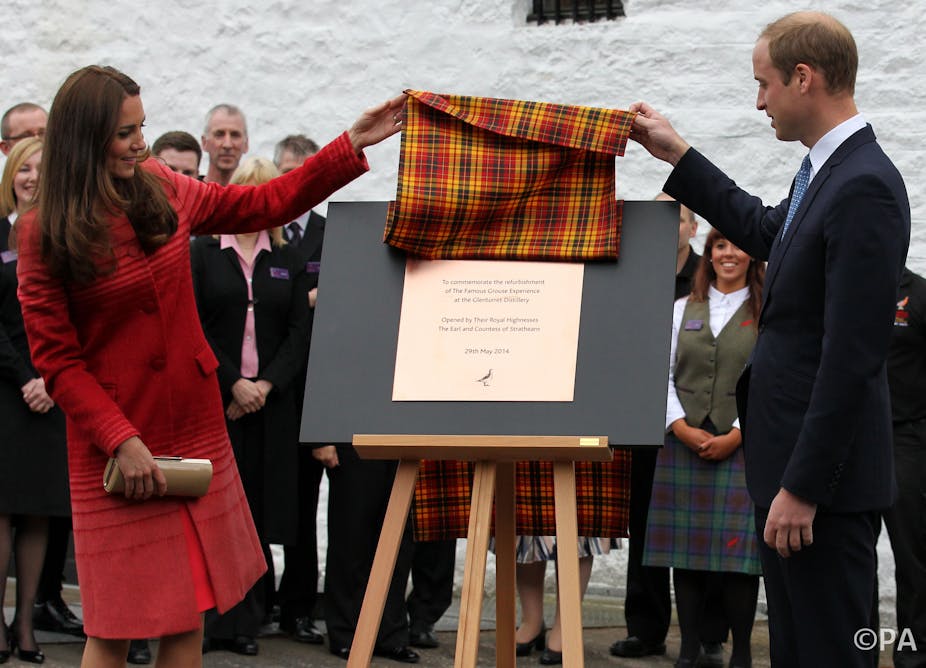If we wanted a reminder of the class system that still overshadows the British Isles, the announcement by Prince William and his wife Kate of a second baby today fitted the bill perfectly. Call me churlish for using a piece of happy news to make an unhappy point, but it doesn’t take a fortune teller to foresee what kind of future this unborn child can look forward to.
This issue was raised recently by “Elitist Britain?”, the report by the Social Mobility and Child Poverty Commission into the British ladder of opportunity. It found that the public schools and elite universities are the shared origins of leaders in the private, public and military establishments. The existence of that elite was judged to mean that democratic Britain is a myth, talent is wasted and active citizenship in the country is being destroyed by our cynicism about any notion of meritocracy.
The Scottish dimension
What about Scotland? As a country on the brink of possible separation from the union, it presents as radically different from England’s elite, supposedly posh world. Scotland thinks of itself as a more democratic, even socialist society. We supposedly subscribe to the idea of the lad o’ pairts, our rough equivalent of the American dream, where anybody with the brains and determination can reach the top. But is this a fair description?
It is worth stressing at the outset that this needs to be properly investigated. We don’t have the sort of figures that emerged from the social mobility commission report. We can say that in stark contrast to Westminster, a very significant proportion of politicians in the Scottish parliament attended local state comprehensive schools and Scottish universities. Oxbridge elites do not have a real presence here. In the Scottish cabinet there are many lawyers, accountants and businesspeople.
When you look at the professions, again you don’t see Oxbridge dominance. That may help to make the Scottish elites more balanced, although institutions such as Edinburgh (67.3% state-school attenders) and St Andrews (58.9%) are admittedly on a par with Oxford (57.4%) and Cambridge (63%) (albeit many of the privately schooled at Edinburgh and St Andrews will be English people who return south after graduating). Scotland also has a higher proportion of public sector activity than down south, accounting for 22.5% of jobs compared to 18.9% in the UK as a whole. These are less likely to be dominated by those from wealthy backgrounds, which is likely to help balance Scotland’s elites slightly more.
If this picture sounds mixed, there is more downside. Inequalities by class in health are especially strong in the west of Scotland and in education at secondary and tertiary levels, inequalities by class compared with England have not declined over time. In devolved Scotland, academic commentators argue that “class has become the social condition that dare not speak its name”.
Where Wills met Kate
We like to think romantic love and character are the only elements of a marriage union and yet if that was so, how can we explain the extremely prevalent fact that partners tend to be chosen from others with identical social standing? William met Kate at the University of St Andrews in Fife, which though serendipitous was broadly predictable as it caters especially for wealthy English students with public school pedigrees.
The rousing morning assembly speeches by masters that I heard while teaching for a spell in a famous Edinburgh public school encouraged upper-class pupils to see themselves as leaders by right. That mindset no doubt inspired the ambition of those holding the prestigious posts described in “Elite Britain?” Tony Blair was educated at Scotland’s Eton, Fettes College. Its badge of aristocratic leanings is clear from the school building. It resonates with ancient authority and permanence.

Standing across the road from this imposing building is the decidedly functional Edinburgh state school Broughton High, where children with different standings in the social order are schooled. Fettes literally looks down on the state system. Around 30% of children in Edinburgh attend private schools, the highest in the UK. Edinburgh is second to London as a major centre for the financial services, which recruit for talent throughout the UK. The elites described by the social mobility commission are highly mobile. Recent research found English people who moved to Edinburgh experience greater mobility than their Scottish counterparts.
Get off one’s land!
More than 50% of Scotland is owned by a landed elite, which some say represents the most concentrated ownership of land in the developed world. State subsidies to these Scottish lairds amount to £1bn per year, it has been estimated. It is probably not unreasonable to state that elite Britain extends into Scotland where networks of class patronage ensure class inequalities that will not go away any time soon.
In short, it is likely that there is a more meritocratic culture in Scotland. There are ways in which it differs from the south of England. But it both has its equivalents and is interconnected to exactly the same system as the one identified by the commission - from Balmoral down. Would it be foolish to argue that a Yes vote is partly a class vote that has been inspired by distaste at this reality? I wouldn’t have thought so.

